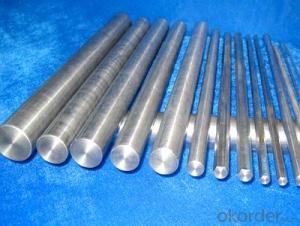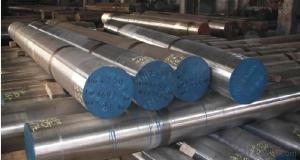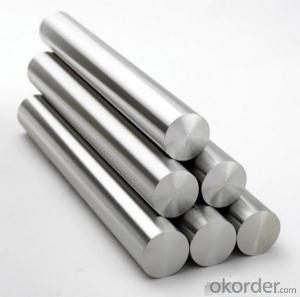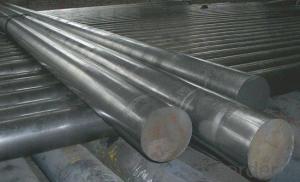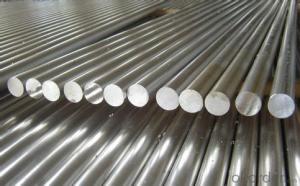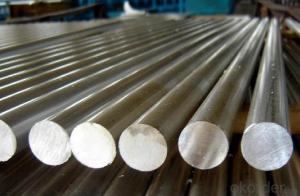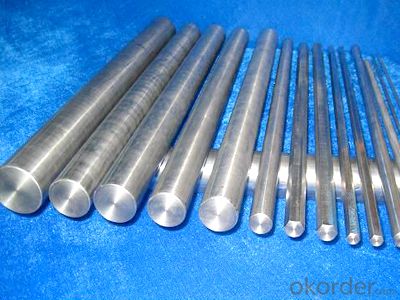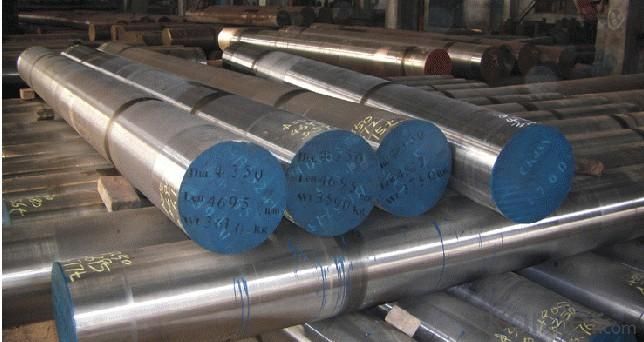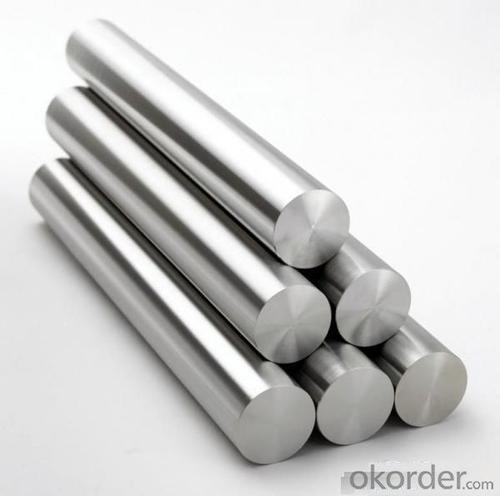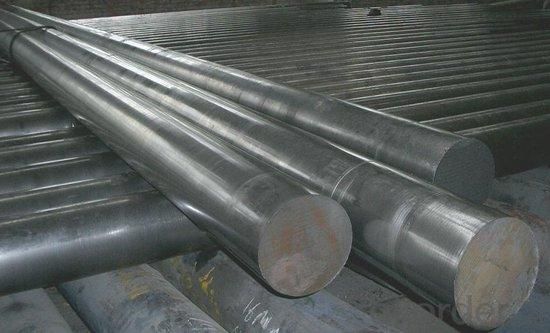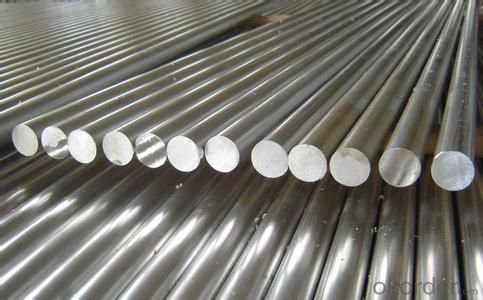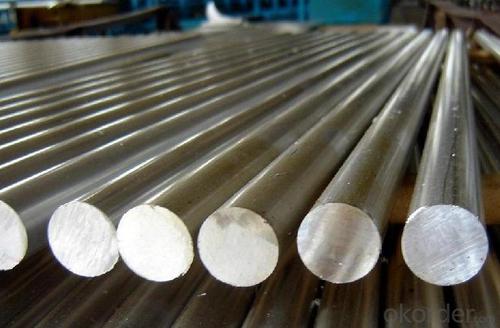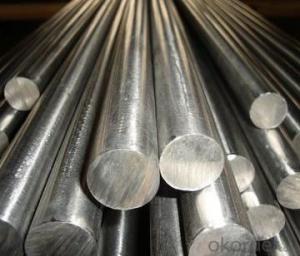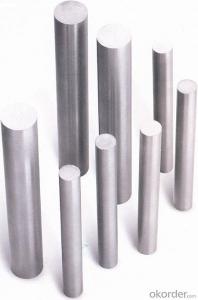Grade AISI 304_316_321 Stainless Steel Round Bar Large Quantity in Stock
- Loading Port:
- Tianjin
- Payment Terms:
- TT OR LC
- Min Order Qty:
- 1 m.t.
- Supply Capability:
- 10000 m.t./month
OKorder Service Pledge
OKorder Financial Service
You Might Also Like
Specification
Grade AISI 304_316_321 Stainless Steel Round Bar in stock
Descriptio of Grade AISI 304_316_321 Steel Round Bar in Stock
(stainless steel round bar, angle bar , flat bar , channel bar , hexagon bar , square bar .)
1.grade:201,202,301,302,303,304,304L,308,309,310,310S,316,316L,321,410,420,430,etc.
2.diameter:3mm-400mm.
3.surface:bright , black , pickeled & bright .
4.length: no more than 6 m .
5.packing: according to international standards of export .
6.trade terms: FOBshanghai , CIF+import port .
7.payment terms: L/C at sight , 30% T/T in advance + copy of B/L .
8.delivery time: within 8 to 12 days since the receipt of payment .
9. MOQ is 1 ton .
Description of Grade AISI 304_316_321 Steel Round Bar in Stock
Standard | AISI , JIS , ER , GB , ASTM , etc. |
| Grade | 201,201,301,302,303,304,304l,308,309,310,310S,316,316L,321,410,420,etc. |
| Application | widely used in the areas as ss fasteners , chains , kitchen and sanitary wares , furniture handles , handrails , electroplating and electrolyzing pendants , foods, electron , petroleum , construction and decoration , etc. with a high strength after cold-drawn , anti-stress corrosion , good surface . |
| Chemcial composition | according to international standards of ASTM , AISI , JIS , ER , GB ,etc. |
Company Information of Grade AISI 304_316_321 Steel Round Bar in Stock
CNBM International Corporation is the most import and export platform of CNBM group(China National Building Material Group Corporation) ,which is a state-owned enterprise, ranked in 270th of Fortune Global 500 in 2015.
With its advantages, CNBM International are mainly concentrate on Cement, Glass, Iron and Steel, Ceramics industries and devotes herself for supplying high quality series of refractories as well as technical consultancies and logistics solution.
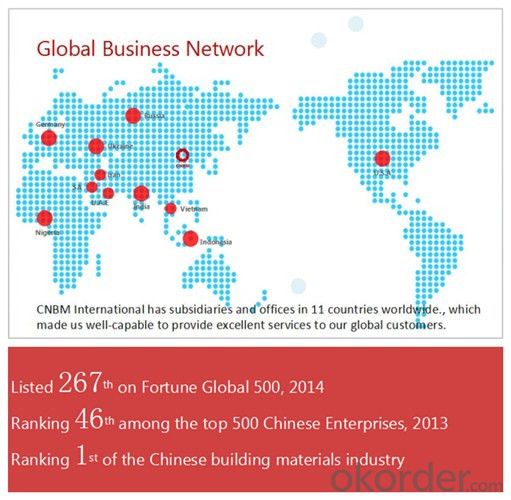
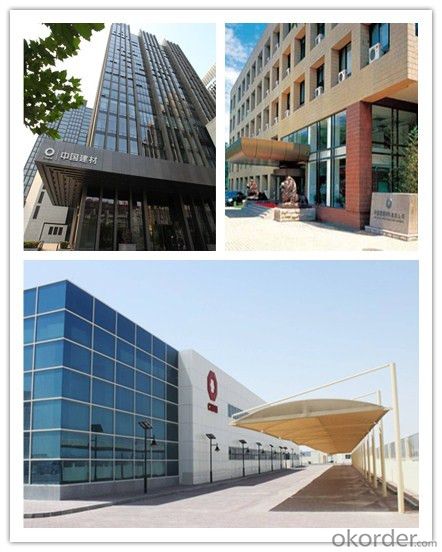
Packaging & Delivery of Grade AISI 304_316_321 Steel Round Bar in Stock
Packaging Detail | Sea worthy packing /as per customer's packing instruction |
Delivery Detail | 15 ~ 40 days after receiving the deposit |
Products Show
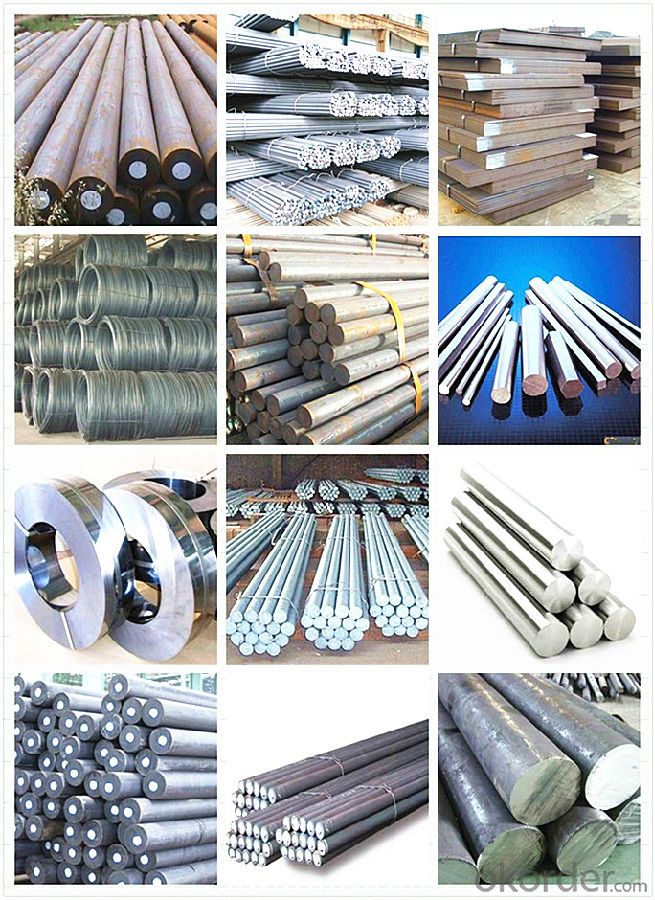
FAQ:
Are you a trading company or manufacturer? | Manufacturer |
What’s the MOQ? | 3 metric ton |
What’s your delivery time? | 15-35 days after downpayment received |
Do you Accept OEM service? | Yes |
what’s your delivery terms? | FOB/CFR/CIF |
What's the Payment Terms? | 30% as deposit,70% before shipment by T/T |
Western Union acceptable for small amount. | |
L/C acceptable for large amount. | |
Scrow ,Paybal,Alipay are also ok | |
Why choose us? | Chose happens because of quality, then price, We can give you both. Additionally, we can also offer professional products inquiry, products knowledge train (for agents), smooth goods delivery, excellent customer solution proposals. |
What's your available port of Shipment? | Main Port, China |
What’s your featured services? | Our service formula: good quality+ good price+ good service=customer's trust
|
Where are your Market? | Covering more than 160 countries in the world |
- Q: How does special steel contribute to the production of precision instruments?
- Special steel contributes to the production of precision instruments by providing the necessary strength, durability, and resistance to corrosion. Its unique properties allow for the manufacturing of intricate components with tight tolerances, ensuring the precision instruments function accurately and reliably.
- Q: How does special steel contribute to the construction aftermarket industry?
- The construction aftermarket industry greatly benefits from the use of special steel, as it offers a wide range of advantages and applications. Firstly, special steel is exceptionally strong and durable, making it perfect for constructing various infrastructure elements like bridges, buildings, and roads. Its high tensile strength allows for greater load-bearing capacity, enhancing the overall safety and longevity of structures. Moreover, special steel is renowned for its resistance to corrosion and extreme weather conditions, making it particularly valuable in construction projects. By utilizing special steel, construction companies can ensure that their structures are better equipped to withstand harsh environments, reducing the need for frequent repairs and replacements. Additionally, special steel provides versatility in terms of fabrication and design. It can be easily molded and shaped into different forms, allowing architects and engineers to create innovative and visually appealing structures. This flexibility enables the construction aftermarket industry to meet various design requirements while maintaining structural integrity. Furthermore, special steel offers long-term cost-effectiveness. Although the initial investment in special steel may be higher compared to other materials, its durability and low maintenance requirements result in reduced lifecycle costs. This makes it a cost-efficient choice for construction projects, as it minimizes ongoing expenses related to repairs and replacements. Lastly, special steel contributes to sustainability in the construction industry. Due to its strength and durability, structures built with special steel have a longer lifespan, reducing the need for frequent demolitions and reconstructions. Additionally, special steel is highly recyclable, promoting a more sustainable approach to construction by minimizing waste and conserving resources. In conclusion, special steel plays a vital role in the construction aftermarket industry by providing superior strength, durability, resistance, versatility, cost-effectiveness, and sustainability. Its exceptional properties contribute to the creation of safer, longer-lasting, and more visually appealing structures, making it an indispensable material for construction projects.
- Q: Is special steel suitable for manufacturing precision components?
- Manufacturing precision components can greatly benefit from the use of special steel. This type of steel is specifically designed to possess exceptional qualities such as high strength, hardness, and resistance to wear, corrosion, and heat. These outstanding characteristics make it the perfect choice for creating precision components that demand tight tolerances, accuracy, and reliability. The inherent strength and hardness of special steel enable the production of durable and long-lasting precision components. This is particularly crucial in industries where components are exposed to intense stress and heavy loads, such as aerospace, automotive, and machinery manufacturing. The wear and corrosion resistance of special steel ensures that the precision components can withstand harsh operating conditions and retain their functionality over extended periods of time. Moreover, special steel's remarkable heat resistance qualifies it for precision components that encounter elevated temperatures. This is especially significant in industries like aerospace and power generation, where components must endure extreme heat without compromising their performance. In addition, special steel offers excellent machinability, which is vital for manufacturing precision components with intricate designs and complex geometries. It can be easily shaped, cut, and formed into various sizes and shapes, enabling the production of intricate and precise components. Overall, the exceptional properties of special steel, including high strength, hardness, resistance to wear, corrosion, and heat, along with its superb machinability, make it highly suitable for manufacturing precision components. Its utilization guarantees the creation of high-quality components that adhere to the stringent requirements of precision applications.
- Q: How does special steel perform in impact loading conditions?
- Special steel is known for its exceptional performance in impact loading conditions. Due to its unique composition and manufacturing process, special steel exhibits remarkable strength, toughness, and resistance to deformation. When subjected to impact loading, special steel can effectively absorb and dissipate the energy generated, minimizing the risk of catastrophic failure or damage. The high strength of special steel allows it to withstand high impact forces without undergoing significant deformation or fracture. This characteristic makes it particularly suitable for applications where impact loading is prevalent, such as in the construction of heavy machinery, automotive components, and structural elements. Special steel's toughness is another crucial factor in its performance during impact loading conditions. It possesses excellent fracture toughness, enabling it to resist crack propagation and absorb impact energy without fracturing. This property ensures that special steel can withstand sudden and severe impacts without compromising its structural integrity. Additionally, special steel is often treated to enhance its resistance to impact loading conditions further. Processes such as heat treatment, forging, and quenching and tempering can increase the material's hardness and strength, making it even more capable of withstanding impact forces. In summary, special steel performs exceptionally well in impact loading conditions due to its high strength, toughness, and resistance to deformation. Its ability to absorb and dissipate energy efficiently, coupled with its resistance to fracture, makes it an ideal choice for applications where impact loading is a concern.
- Q: What is the role of special steel in the automotive industry?
- Special steel plays a crucial role in the automotive industry by providing strength, durability, and resistance to wear and corrosion for various components. It is used in the production of engine parts, chassis components, transmission systems, and safety features, ensuring enhanced performance, reliability, and safety in vehicles.
- Q: What are the different methods of surface polishing for special steel?
- Some of the different methods of surface polishing for special steel include mechanical polishing, chemical polishing, electropolishing, and abrasive blasting. Mechanical polishing involves using abrasive materials like sandpaper or polishing wheels to remove imperfections and create a smoother surface. Chemical polishing uses chemical solutions to dissolve a thin layer of the steel's surface, resulting in a polished finish. Electropolishing is an electrochemical process that removes surface material through the application of an electric current, resulting in a smooth and shiny surface. Abrasive blasting, also known as sandblasting, involves propelling abrasive particles at high speeds to remove rust, scale, or other surface contaminants, leaving a polished surface.
- Q: What are the different welding methods used for special steel?
- There are several welding methods that can be used for special steel, depending on the specific requirements of the project. Some of the commonly used welding methods for special steel include: 1. Gas Metal Arc Welding (GMAW): Also known as MIG welding, this method uses a consumable electrode and a shielding gas to protect the weld from atmospheric contamination. GMAW is ideal for welding special steel as it provides high-quality, clean welds with minimal spatter. 2. Gas Tungsten Arc Welding (GTAW): Also known as TIG welding, this method uses a non-consumable tungsten electrode and a shielding gas to protect the weld. GTAW is often used for special steel as it allows for precise control over the welding process, resulting in high-quality, defect-free welds. 3. Shielded Metal Arc Welding (SMAW): Also known as stick welding, this method uses a consumable electrode coated in flux to protect the weld. SMAW is commonly used for special steel as it is a versatile and portable method that can be used in various positions and environments. 4. Flux-cored Arc Welding (FCAW): This method uses a tubular electrode filled with flux to protect the weld. FCAW is often used for special steel as it provides high deposition rates and deep penetration, making it suitable for thicker materials. 5. Submerged Arc Welding (SAW): This method uses a continuously fed wire electrode and a granular flux that is applied around the weld. SAW is commonly used for special steel as it can produce high-quality, high-integrity welds in thick sections. It is important to note that the selection of the appropriate welding method for special steel depends on various factors such as the type and thickness of the steel, the desired weld quality, and the specific application requirements. Therefore, it is recommended to consult with welding professionals or engineers to determine the most suitable method for a particular project involving special steel.
- Q: How does special steel contribute to weight reduction in manufacturing?
- Special steel is a type of steel that has been specifically engineered to possess certain characteristics that make it suitable for various applications in manufacturing. One of the key advantages of special steel is its ability to contribute to weight reduction in manufacturing processes. Special steel is often utilized in industries where weight reduction is crucial, such as automotive, aerospace, and construction. This is because special steel possesses a high strength-to-weight ratio, meaning it can provide the required strength and performance while being lighter in weight compared to other materials. By using special steel in manufacturing processes, companies can achieve weight reduction in several ways. Firstly, the lightweight nature of special steel allows for the production of components and structures that are significantly lighter than those made from conventional steel or other materials. This reduction in weight can have numerous benefits, including improved fuel efficiency in automobiles, increased payload capacity in aircraft, and easier handling and installation in construction projects. Additionally, special steel's high strength-to-weight ratio enables manufacturers to design and produce thinner, yet equally strong, components. This not only reduces the overall weight of the manufactured product but also allows for more efficient use of materials, leading to cost savings and a more sustainable manufacturing process. Furthermore, special steel's unique properties, such as its excellent formability and weldability, enable manufacturers to create complex and intricate designs that can further contribute to weight reduction. This versatility allows for the production of lightweight components with intricate shapes and structures, which can enhance overall performance and functionality. In summary, special steel plays a crucial role in weight reduction in manufacturing processes. Its high strength-to-weight ratio, lightweight nature, excellent formability, and weldability enable the production of lighter components and structures. By utilizing special steel, industries can achieve improved efficiency, performance, and sustainability in their manufacturing operations.
- Q: What are the challenges in heat treatment of special steel?
- Some challenges in the heat treatment of special steel include achieving the desired hardness and strength without compromising other properties, such as toughness and corrosion resistance. Special steels often have complex compositions, which can make it difficult to accurately control the heat treatment process. Additionally, heat treatment of special steel can be time-consuming and costly due to the need for precise temperature and time control, as well as the potential for distortion or cracking during the heat treatment process.
- Q: How does special steel resist wear and tear?
- Special steel resists wear and tear due to its unique composition and manufacturing process. It is made with a higher percentage of alloying elements such as chromium, nickel, and molybdenum, which enhance its hardness, strength, and corrosion resistance. This increased hardness enables the steel to withstand abrasion, friction, and impact, making it highly durable and resistant to wear and tear. Additionally, special steel undergoes specialized heat treatments and mechanical processes that further enhance its toughness and resistance to deformation, contributing to its ability to withstand harsh and demanding conditions without significant deterioration.
Send your message to us
Grade AISI 304_316_321 Stainless Steel Round Bar Large Quantity in Stock
- Loading Port:
- Tianjin
- Payment Terms:
- TT OR LC
- Min Order Qty:
- 1 m.t.
- Supply Capability:
- 10000 m.t./month
OKorder Service Pledge
OKorder Financial Service
Similar products
Hot products
Hot Searches
Related keywords
